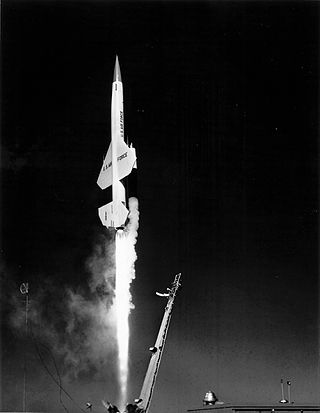
The Boeing CIM-10 Bomarc was a supersonic ramjet powered long-range surface-to-air missile (SAM) used during the Cold War for the air defense of North America. In addition to being the first operational long-range SAM and the first operational pulse doppler aviation radar, it was the only SAM deployed by the United States Air Force.

The National Register of Historic Places (NRHP) is the United States federal government's official list of sites, buildings, structures, districts, and objects deemed worthy of preservation for their historical significance or "great artistic value".

White Sands Missile Range (WSMR) is a United States Army military testing area and firing range located in the US state of New Mexico. The range was originally established in 1941 as the Alamogordo Bombing and Gunnery Range, where the Trinity test site lay at the northern end of the Range, in Socorro County near the towns of Carrizozo and San Antonio. It then became the White Sands Proving Ground on 9 July 1945.

Cape Canaveral Space Force Station (CCSFS) is an installation of the United States Space Force's Space Launch Delta 45, located on Cape Canaveral in Brevard County, Florida.
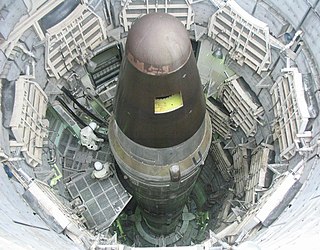
The Titan Missile Museum, also known as Air Force Facility Missile Site 8 or as Titan II ICBM Site 571-7, is a former ICBM site located about 40 km (25 mi) south of Tucson, Arizona in the United States. It was constructed in 1963 and deactivated in 1984. It is now a museum run by the nonprofit Arizona Aerospace Foundation and includes an inert Titan II missile in the silo, as well as the original launch facilities.

The Minuteman Missile National Historic Site is an American national historic site established in 1999 near Wall, South Dakota, to illustrate the history and significance of the Cold War, the nuclear arms race, and intercontinental ballistic missile (ICBM) development. The site preserves the last intact Minuteman II ICBM system in the United States, in a disarmed and demilitarized status. Guided tours are available of the underground Launch Control Center, and a missile silo can be observed from above. Some 450 of the newer Minuteman III missiles are still on active duty at Malmstrom AFB, Montana, Minot AFB, North Dakota, and F. E. Warren AFB, Wyoming.

The Air Force Missile Development Center and its predecessors were Cold War units that conducted and supported numerous missile tests using facilities at Holloman Air Force Base, where the center was the host unit.

Wendover Air Force Base is a former United States Air Force base in Utah now known as Wendover Airport. During World War II, it was a training base for B-17 and B-24 bomber crews. It was the training site of the 509th Composite Group, the B-29 unit that carried out the atomic bombings of Hiroshima and Nagasaki.

The Nike Missile Site HM-69 is a former Nike-Hercules missile base, now listed as a historic site west of Homestead, Florida, United States. It is located on Long Pine Key Road in the Everglades National Park. The site with 22 buildings opened in 1964 and closed in 1979 when it was turned over to the National Park Service.
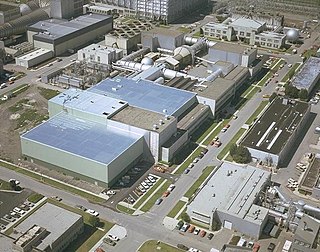
The Unitary Plan Wind Tunnel, located at the NASA Ames Research Center in Moffett Federal Airfield, Mountain View, California, United States, is a research facility used extensively to design and test new generations of aircraft, both commercial and military, as well as NASA space vehicles, including the Space Shuttle. The facility was completed in 1955 and is one of five facilities created after the 1949 Unitary Plan Act supporting aeronautics research.

Space Launch Complex 10 (SLC-10), or Missile Launch Complex 10, is located on Vandenberg Space Force Base in Lompoc, California. It was built in 1958 to test ballistic missiles and developed into a space launching facility in 1963. Prior to 1966, Space Launch Complex 10W (SLC-10W) was known as Vandenberg AFB Pad 75-2-6. It remains a rare pristine look at the electronics and facilities created in that era that helped the United States grow its space capabilities.

The White Sands V-2 Launching Site, also known as Launch Complex 33 and originally as Army Launch Area Number 1, is an historic rocket launch complex at White Sands Missile Range in southern New Mexico. It was here that the United States first performed test launches of German V-2 rockets captured toward the end of World War II. These tests were the first step in both military advances in rocketry, and in the development of the United States space exploration programs. The site was designated a National Historic Landmark in 1985.

The Oscar-Zero Missile Alert Facility near Cooperstown, North Dakota, US was listed on the National Register of Historic Places in 2008. Also known as Oscar-Zero MAF and as O-0 MAF, it exemplifies Utilitarian architecture. The NRHP listing included 2 contributing buildings, 9 contributing structures, and one contributing object.
The Santa Rosa Island Range Complex is a component of the Eglin AFB testing range, located 17.5 miles west-southwest of the main base, on Santa Rosa Island, sitting between the communities of Navarre and Okaloosa Island.
Knolls is an unincorporated community in north-central Tooele County, Utah, United States.

The Nike Ajax was an American guided surface-to-air missile (SAM) developed by Bell Labs for the United States Army. The world's first operational guided surface-to-air missile, the Nike Ajax was designed to attack conventional bomber aircraft flying at high subsonic speeds and altitudes above 50,000 feet (15 km). Nike entered service in 1954 and was initially deployed within the United States to defend against Soviet bomber attacks, though it was later deployed overseas to protect US military bases, and was also sold to various allied militaries. Some examples remained in use until the 1970s.
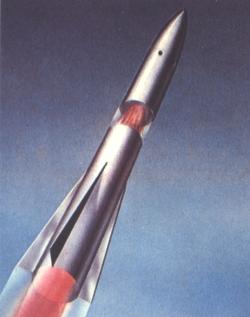
Project Wizard was a Cold War-era anti-ballistic missile system to defend against short and medium-range threats of the V-2 rocket type. It was contracted by the US Army Air Force in March 1946 with the University of Michigan's Aeronautical Research Center (MARC). A similar effort, Project Thumper, started at General Electric.
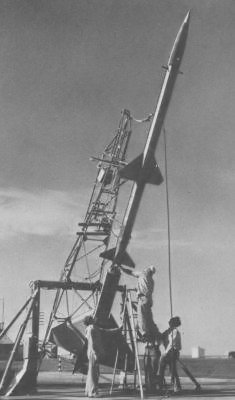
The Ground-to-Air Pilotless Aircraft (GAPA) was a short-range surface-to-air missile (SAM) developed in the late 1940s by Boeing for the United States Army Air Forces, and then the United States Air Force after 1948. It was given the reference number SAM-A-1, the first Surface-to-Air Missile (SAM) in the 1947 tri-service designation system. By 1950, over 100 test rockets had been launched using a variety of configurations and power plants, with one launch in 1949 setting the altitude record for a ramjet powered vehicle at 59,000 ft (18,000 m).

Nike Missile Site C-47 is a former missile site near Portage, Indiana. The Nike defense system was a Cold War-era missile system in the United States. Nike missiles were radar guided, supersonic antiaircraft missiles. The planners hoped that Nike would make a direct attack on the U.S. so costly as to be futile.


















